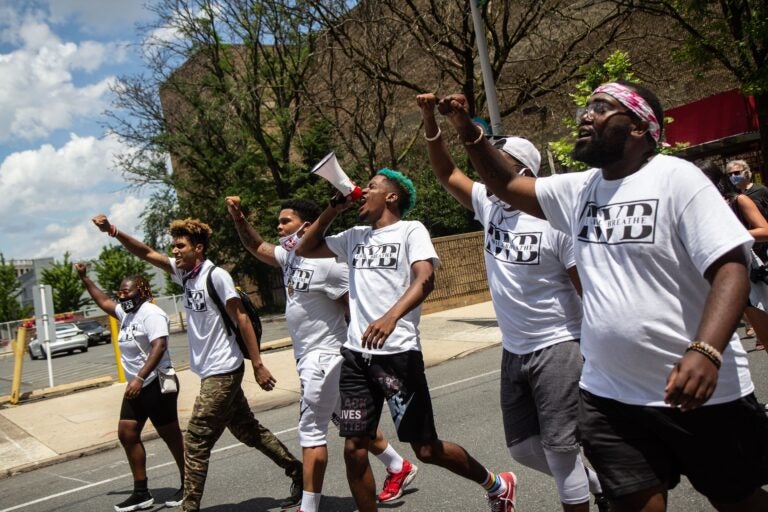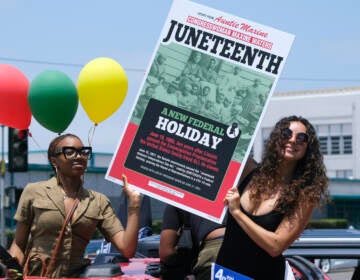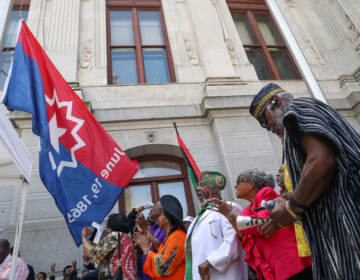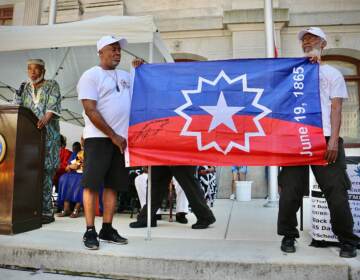This year Juneteenth is more meaningful
Juneteenth is more than a remembrance of the day in 1865 when 2000 Union troops marched into Galveston Texas, and told enslaved blacks they were free.

Nasir Bell (on the bullhorn) chants “I will breathe” at a protest march on Juneteenth. Bell, 22, started his organization, I Will Breathe, will other protesters he met during his arrest at a protest in Philadelphia on June 1. (Kimberly Paynter/WHYY)
Juneteenth is a celebration that can’t be contained in twenty-four hours, because while it commemorates the day that African Americans were truly freed from slavery, freedom is not finite.
And so, this weekend as I watch Donald Trump hold a political rally at an indoor arena even as a deadly virus circulates, I will celebrate freedom. This Father’s Day, as I watch families like mine say thank you to fathers like me, I will celebrate freedom.
That’s because Juneteenth is more than a remembrance of the day in 1865 when 2000 Union troops marched into Galveston Texas, and told enslaved blacks they were free. No, Juneteenth is the remembrance of all those who lived their lives in bondage so I could live without limits.
That’s what I celebrate every year. However, this year Juneteenth is more meaningful. Not just because the world watched a video of a black man named George Floyd losing consciousness as a white police officer pressed a knee into his neck. Not just because Floyd’s death sparked worldwide protests against the ongoing brutality that Black people experience at the hands of police. Juneteenth is more meaningful because I saw for the first time the handwritten order that General Gordan Granger handed down that day in Galveston.
That handwritten document, which was recently discovered in the National Archives in Washington DC, was simple and direct. But that original handwritten order, which came two years after the Emancipation Proclamation, didn’t just say slaves were free. It described what freedom meant.
Signed by Major F.W. Emery on behalf of Major General Gordon Granger, the order said, “The people of Texas are informed that, in accordance with a proclamation from the Executive of the United States, all slaves are free. This involves an absolute equality of personal rights and rights of property between former masters and slaves and the connection heretofore existing between them becomes that between employer and hired labor.”
Two words scream out to me from the page: Absolute equality.
Not anyone’s knee on our neck. Not anyone’s gun in our face. Not anyone following us in stores or shooting us in our homes or jailing us by the millions.
Absolute equality.
That’s what we celebrate on Juneteenth. The idea that Black people and white people are absolutely equal, with no exceptions. We celebrate the idea that our history does not begin with slavery. That our lives matter just as much as anyone’s. That our dreams are bigger than chains.
Absolute equality.
That’s what Juneteenth is about. Celebrating a people who survived every atrocity, thrived in spite of slavery, and came out the other side with dreams that could never be contained in a single day.
We celebrate because our minds were always free, even when our bodies were not. That’s why, as we commemorate the end of physical slavery, we celebrate the freedom of our minds.
We’re free to point out that America reneged on its promise of absolute equality. We’re free to demand the respect we’ve earned from building America’s wealth. We’re free to demand that no knees be placed on our necks.
So, excuse me if my celebration of Juneteenth goes beyond a single day. After all, Juneteenth was supposed to guarantee that equality was absolute.
We must not stop until it is.

Show your support for local public media
WHYY is your source for fact-based, in-depth journalism and information. As a nonprofit organization, we rely on financial support from readers like you. Please give today.





